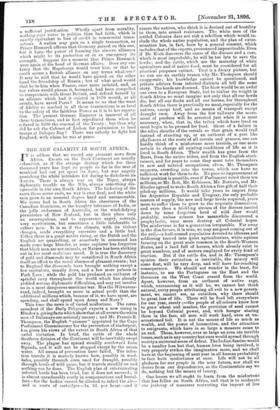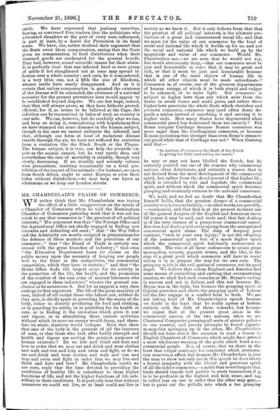THE NEW CALAMITY IN SOUTH AFRICA.
TT is seldom that we record any pleasant news from 4_ Africa. Events on the Dark Continent are usually calamities, as if the strange destiny which for three thousand years has kept its people so far in the rear of mankind had not yet spent its force, but was angrily :punishing the white intruders for daring to disbelieve its decrees. There is always war on the Niger, always diplomatic trouble on the Nile, always something dis- agreeable in our own South Africa. The bickering of the races there never ends, no war is ever final, and the white .men grow to an unusual degree hard and unreasonable. We never find in South Africa the cheeriness of the Canadian Dominion, or the haughty tolerance of India, or the jolly endurance of Australia, or the wind-defying persistence of New Zealand, but in their place only an unscrupulous, and to appearance angry, courage, very meritorious, but sometimes a little intolerable to calmer men. It is as if the climate, with its violent changes, made everything excessive and a little bad. Either there is a great native rising, or the Dutch and the English are quarrelling, or somebody in command has oiade some huge blunder, or some explorer has forgotten that black men are not animals, or Nature has been striking out in her most malicious mood. It is true the discovery of gold and diamonds may be considered in South Africa itself an offset to the usual absence of pleasant events ; but to England the diamonds have brought nothing except a few capitalists, usually Jews, and a few more palaces in Park Lane ; While the gold has produced an outburst of spiteful envy throughout the world which has already yielded serious diplomatic difficulties, and may yet involve os in a most dangerous maritime war. Has the Witwaters- rand, indeed, brought us more in actual profit than the additional millions which, because of it, we have spent, are spending, and shall spend upon Army and Navy ? This time the news is of varied misfortune. The corre- spondent of the Daily Telegraph expects a new rising in Rhodesia, givin g facts which show that at all events the white men of Bulawayo are seriously uneasy ; and Mr. Francis R. Thompson, the English " pioneer" appointed by the Cape Parliament Commissioner for the prevention of rinderpest, has given his views of the extent in South Africa of that awful visitation. In brief, the cattle of the whole Southern division of the Continent will be inevitably swept away. The plague has spread steadily southward from Uganda, and it will not be stopped except by the ocean water. All means of prevention have failed. The infec- tion travels it is scarcely known how, possibly in wool- bales, possibly through oxen used for draught, possibly through herds of wild game, but it travels steadily on and nothing can be done. The English plan of exterminating infected herds has been tried, but it does not succeed ; it is almost unendurable costly in compensations and burial- fees—for the bodies cannot be allowed to infect the air— and in waste of cartridges—ls. 3d. per beast—and it rouses the natives, who think it is devised out of hostility to them, into armed resistance. The white men of the settled Colonies dare not risk a rebellion which would in- clude the whole native population, and the plan of exter- mination has, in fact, been by a general consent, which includes that of the experts, pronounced impracticable. Even if Dr. Koch discovers the cause of the disease and a cure, which is most improbable, he will be too late to save the herds ; and the cattle, which are the mainstay of white agriculture and of native food, must be considered for all practical purposes extinct. That is a dreary picture, but we can see no earthly reason why Mr. Thompson should exaggerate ; his knowledge cannot be questioned, and private advices from infected districts all tell the same story. The herds are doomed. The blow would be an awful one even to a European State, but to realise its weight in South Africa we must imagine not only that all our herds die, but all our flocks and all our horses, for throughout South Africa there is practically no meat, especially for the natives, except beef, and no means of transport except draught oxen. Away from the few railways the move- ment of produce will be arrested just when it is most necessary, when, that is, the tribes which have lived on meat begin to be pressed for food. Short of a failure in the silica sheaths of the cereals so that grain would trail instead of standing up, or an outburst of a pest like phylloxera at the roots of all cereals and grasses, one can hardly think of a misfortune more terrible, or one more certain to change all existing conditions of life as it is lived in South Africa. Their wealth has gone from the Boers, from the native tribes, and from the English stock- raisers, and for years to come they must take themselves to new and untried occupations, often, Mr. Thompson suggests, crowding into the towns, which can have no sufficient work for them to do. No present improvement of their position is possible, even if Parliament voted them ten millions, or Mr. Bait, Mr. Robinson, Mr. Barnato, and Mr. Rhodes agreed to make South Africa, a free gift of half their piled-up millions. It would take years to import from the Argentine Republic and Uruguay, the only probable sources of supply, the new and large herds required, years more to suffer them to grow to the requisite dimensions, and even then a trickling stream of the disease carried down by some forgotten herd of wild deer would probably, unless science has meanwhile discovered a prophylactic, once more destroy all Colonial hopes. The misfortune is for a generation irreparable. Far away in the dim future, it is true, we may see good coming out of the evil,—a half-nomad population devoted to idleness and soldiering turned into quiet agriculturists, white squires farming on the great scale common in the South-Western States, and a land full of horses, which already exist in great numbers, and of motors employed for every kind of traction. But if the cattle die, and in Mr. Thompson's opinion their extinction is inevitable, the misery will come first, will be very deep, and will have far-reaching consequences. We should not wonder in the least, for instance, to see the Portuguese on the East and the Germans on the West Coast erased from the world. Apart, however, from an outburst of native rage, which, unreasoning as it will be, we cannot but think natural, every people attributing all evil to a new govern- ment, we cannot see, as outsiders, why there should be great loss of life. There will be food left everywhere for one year, surely ;—the people of all colours know how to grow wheat and mealies, the provision of seed cannot be beyond Colonial power, and, with hunger staring them in the face, all men will work hard, even at un- accustomed toil. It is not the means of life so much as wealth, and the power of locomotion, and the attraction to emigrants, which have in so large a measure come to an end. Those, however, over so large an area are terrible losses, such as in any country but ours would spread through society a universal sense of defeat. The Indian famine would be a smaller loss but that, human lives being involved, it very properly strikes the imagination more, and we shall have at the beginning of next year in all human probability to face both misfortunes at once. Life will not be all gladness for our people in the near future,• nor shall we derive from our dependencies, as the Continentals say we do, nothing but the means of luxury.
One lesson we all ought to learn from the misfortune that has fallen on South Africa, and that is to moderate our jealousy of measures restricting the import of live cattle. We have expressed that jealousy ourselves, fearing, as convinced Free-traders, that the politicians who advocated slaughter at the port of entry were influenced, in part at least, by a desire for Protection in its fiscal sense. We have, too, rather doubted their argument that the State owed them compensation, seeing that the State gives no compensation to food distributors when their unsound goods are confiscated for the general benefit. They had, however, sound scientific reason for their alarm. It is perfectly clear that one infected herd or even group of cattle if not slaughtered out at once may spread in- fection over a whole country ; and ours, be it remembered, is a very little one, not a fifth the size of Rhodesia, whence cattle have nearly disappeared. And as it is certain that unless compensation is granted the existence of the disease will be concealed, the existence of a national necessity for the present preventive laws would appear to be established beyond dispute. We can but hope, indeed, that they will always prove, as they have hitherto proved, efficient, for if, as seems to be believed at the Cape, the infection can be transmitted in bales of wool, no country is ever safe. We can, however, but do carefully what we can, and keep on doing it, remembering with hopefulness that we have stamped out some diseases in the human subject, though in his case we cannot extirpate the infected, and that, although one form at least of malarious disease travels through the air, we have not suffered for centuries from a visitation like the Black Death or the Plague. The human subject, it is true, can help the scientific ex- pert as the animal cannot, but he very rarely does, and nevertheless the rate of mortality is steadily, though very slowly, decreasing. If we steadily and severely enforce wise precautions, insisting occasionally on a total pro- hibition of the import of live animals—for instance, no oxen from South Africa ought to enter Europe, or even their hides without disinfection—we may keep our byres as wholesome as we keep our London streets.























































 Previous page
Previous page